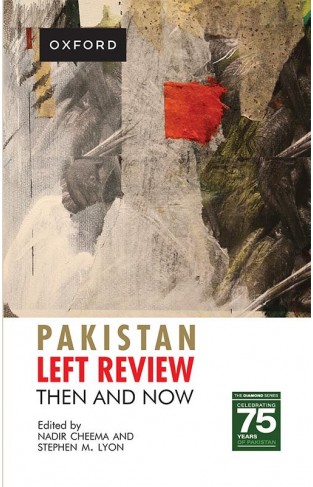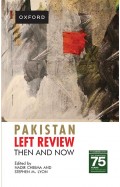Pakistan left review: then and now
By: Nadir Cheema
-
Rs 906.75
- Rs 1,395.00
- 35%
You save Rs 488.25.
Due to constant currency fluctuation, prices are subject to change with or without notice.
This volume places the spotlight on an important moment in history. The late 1960s was a time of profound change around the world, and the contributions included here from Pakistan’s leftist intellectuals based in London, speak volumes about the implications of the turbulence and the promise for a better future in relation to Pakistan. More than five decades on, the promise of a better tomorrow looks as far away as ever, but the turbulence has returned with a vengeance. The newly written contributions reflect on the significance of this leftist journal at the time and the impact of those ideas and discourses on the politics that came to be.
Challenging the triumphant narratives of global capitalism long before the current impasse created by the mantra of neoliberal market fundamentalism, the essays reproduced here from the PLR underscore how critical intellectual engagement with history and other social science disciplines can offset the disillusionment and lack of direction in our increasingly troubling present. An overture to a fairer and more equitable deal for the disempowered and exploited, the volume is a must read for anyone interested in the history of the left in Pakistan.
This volume places the spotlight on an important moment in history. The late 1960s was a time of profound change around the world, and the contributions included here from Pakistan’s leftist intellectuals based in London, speak volumes about the implications of the turbulence and the promise for a better future in relation to Pakistan. More than five decades on, the promise of a better tomorrow looks as far away as ever, but the turbulence has returned with a vengeance. The newly written contributions reflect on the significance of this leftist journal at the time and the impact of those ideas and discourses on the politics that came to be.
Challenging the triumphant narratives of global capitalism long before the current impasse created by the mantra of neoliberal market fundamentalism, the essays reproduced here from the PLR underscore how critical intellectual engagement with history and other social science disciplines can offset the disillusionment and lack of direction in our increasingly troubling present. An overture to a fairer and more equitable deal for the disempowered and exploited, the volume is a must read for anyone interested in the history of the left in Pakistan.
Zubin Mehta: A Musical Journey (An Authorized Biography)
By: VOID - Bakhtiar K. Dadabhoy
Rs 472.50 Rs 1,050.00 Ex Tax :Rs 472.50
The Origins of Political Order From Prehuman Times to the French RevolutioN
By: Francis Fukuyama
Rs 3,116.00 Rs 3,895.00 Ex Tax :Rs 3,116.00
Manning Up: How the Rise of Women Has Turned Men into Boys
By: Kay Hymowitz
Rs 646.75 Rs 995.00 Ex Tax :Rs 646.75
The Obama Syndrome: Surrender At Home War Abroad
By: Tariq Ali
Rs 1,036.00 Rs 1,295.00 Ex Tax :Rs 1,036.00
The Quest For Meaning: Developing A Philosophy Of Pluralism
By: Tariq Ramadan
Rs 1,116.00 Rs 1,395.00 Ex Tax :Rs 1,116.00
The Pakistan US Conundrum Jihadists The Military And The People The Struggle For Control
By: Yunas Samad
Rs 1,116.00 Rs 1,395.00 Ex Tax :Rs 1,116.00
An Enemy We Created: The Myth Of The Taliban Al Qaeda Merger In Afghanistan 19702010
By: Alex Strick van Linschoten
Rs 3,412.50 Rs 5,250.00 Ex Tax :Rs 3,412.50
WikiLeaks: Inside Julian Assanges War on Secrecy
By: David Leigh & Luke Harding
Rs 552.50 Rs 850.00 Ex Tax :Rs 552.50
No similar books from this author available at the moment.
No recently viewed books available at the moment.
Zubin Mehta: A Musical Journey (An Authorized Biography)
By: VOID - Bakhtiar K. Dadabhoy
Rs 472.50 Rs 1,050.00 Ex Tax :Rs 472.50













-120x187.jpg?q6)





-120x187.jpg?q6)



-120x187.jpg?q6)



